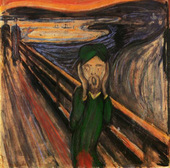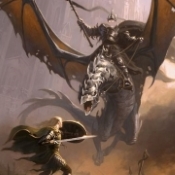Quorum posted:It's a game mechanic: the Imperial Challenge CB works like that. It's unlocked by a late game tech, but some countries get to use it early in specific circumstances (Rome during some early wars, for example, or the Diadochi against each other). ah that would make sense then, I was trying to figure out why they were expanding so much quicker than me hashashash fucked around with this message at 05:04 on Dec 25, 2022 |
|
|
|
|

|
| # ? May 12, 2024 11:07 |
 Part 3 — Uneasy Peace — 270 BCE to 220 BCE A rabid wolf sits at our door. Scarcely a generation ago, this wolf was little more than a pup, one with no real authority beyond her own barbarous kin and the unfortunates who surrounded her… but now, the spectre of Rome rises over Italia, casting a menacing shadow that threatens to choke Carthage and cloak the rest of the Mediterranean in her bitter darkness. War is inevitable.  But when the fighting begins, it must be on Carthaginian terms. Therefore, despite an avid minority advocating an immediate war (and an even smaller minority calling for impossible friendships), the senate of Carthage financed an expansion of the navy and reparation of the city walls.   Prudent measures, but nothing that would antagonise the Romans. Instead, the popular assembly directed the Carthaginian war effort towards Carthaginian interests — namely, trade. To better cement her dominance over the maritime routes spanning the Mediterranean, a mandate of war is passed against the bothersome tribes of Sardinia and Baleareis.  And to carry through this mandate, a young and talented scion of the Barca family is appointed as commander: Hamilcar Barca. Ferrying a large force of Berber mercenaries across the sea, Hamilcar set to seizing key fortresses and ports before annihilating the island natives in a string of one-sided battles.    Victory is all but assured, and yet, when young Hamilcar marched on the last holdout on the island — Viniolae, on the northern coast — he found another army waiting, laced in leather and clasping steel and flying blood-red vexilla…  Rome. Hamilcar immediately dispatched messengers to Carthage, requesting the senate’s permission to shear this Roman ulcer from Sardinia, but the orders that arrived some weeks later were not to his liking. Carthage was not ready for war. Despite an impassioned speech in which he insisted that the elephant could slay the wolf, the senate refused to budge its stance — they did authorise an expedition to Greece, to counter Roman influence in the region, but a disgusted Hamilcar resigned his post and departed the army, leaving the senate to appoint another commander (one Eshbaal Magonid, a rival of Hamilcar’s belonging to another ancient Punic family) to lead the effort.  The campaign proved to be short and successful; these Spartans were a far cry from their ancestors who’d once bloodied Xerxes and denied Athens, or even those who outfaced Alexander not so long ago.    Instead, after suffering a string of defeats in battle and siege, the Spartans ceded the island-port of Kythira and pledged to pay an annual tribute to Carthage.   The state of Greece in 258 BCE; Carthage owns Qitera (Kythira) and has Sparta as a vassal, Rome owns Korkyra (Corfu) and has Epirus as a vassal. On the subject of Greeks, word soon reached Carthage that the Massilians were slipping through the pillars of Hercules and into the Outer Seas in search of new trading opportunities (and mythical islands, if the stories are to be believed).  Refusing to be outdone by any wretched Greek, the senate immediately commissioned a merchant-captain by the name of Bodashtart to embark on a voyage in the tradition of the great Punic seafarers — Himilco who explored the vast and savage Europas to the north, and Hanno who sailed into the distant south and trod across Gold-rich lands, consorting with all manner of wonders and horrors.   Bodashtart sails into the West to great fanfare in the year 253 BCE; as he departs, the Sophet watches from the white citadel atop the hill of Byrsa, the walls and shores are thronging with hundreds of thousands of citizens, the merchant harbour and the Great Cothon are both brimming with vessels paying their dues… the Shining City is alive, and thriving.  The senate chambers — or the House of the Adirim, as the vast palace-complex is known in Punic — was similarly packed, with the elderly senators and magisters of the Republic quarrelling and debating to no end. Eventually, in 248 BCE, the traditionalists force through a motion by which another military expedition would be dispatched, this time to safeguard Punic colonies against the self-styled ‘king of the Numidians’, who in recent years had managed to unite the many disparate Berber tribes under his rule.   This expedition soon dragged out into a long and bloody war, one that stretched out across a decade — battles were fought and won at Qishi and Gunugu, ambushes were sprung and suffered at Aras and Turusuctu, there were sieges and counter-sieges, sackings and massacres…     …but Carthaginian wealth would see her through in the end, as a force of 18,000 Greek and Sardinian mercenaries stormed the Berber capital at Siga in the year 236 BCE, bringing the war to a close.   The peace imposed on the Numidians was not lenient; forced to cede their coasts and harbours, open their markets to Punic trade, and abandon any foolish notions of ‘Numidian unity’, it will surely be many years and more before they dare to challenge Carthage again.    At much the same time, rumours and tales continued to trickle into Carthage — including many about Hamilcar Barca, who had not been idle since resigning his position…  Indeed, inheriting Abdmelqart as the patriarch of the Barcids, he employed the vast financial and political prowess of his family to wage an illegal war in Iberia.  Several wars, in fact, and over the course of these wars he quickly proved himself a very capable commander, winning decisive victories over allied Iberian armies at Gadir, and then Kartuba, and then Oretum.       More minor battles followed these, but no less decisive — and with every battle he won, with every year that passed, Hamilcar expanded on his territories in Iberia…    …and in doing so, he may have won vast riches for himself and the Barcids, but he also exploited the immense mineral wealth of Iberia, expanded trade networks for Carthaginian merchants, paved the way for further Punic colonies, and above all, continued to pay tribute to the Ever-Shining City. And then the Romans arrived.  Everywhere he set foot, Carthage staked a claim; everywhere Carthage was, Rome inevitably followed. Italia, Sardinia, Greece, and now Iberia — Barcid Iberia, as far as Hamilcar was concerned… the Romans were intent on blood and war, and they would have it sooner or later. This was the rallying cry with which Hamilcar Barca, newly returned from his conquests and more popular than ever, campaigned in the year 222 BCE, and at long last, the senate answered by raising him to the supreme position of Sophet.  And he wasted no time in raising the levies, recruiting mercenaries, outfitting his warships — and when Hamilcar Barca crosses into Italia a month later, the crescent moon-and-sun disc battle-standard of Carthage is planted firmly into the stony ground.   The first of the Punic Wars has begun. hashashash fucked around with this message at 17:21 on Nov 10, 2023 |
|
|
|
|
The first of a two-parter - currently sorting the next update, should be up in a couple hours
|
|
|
|
|
Ally with the Gauls, I heard they have a secret potion that enables them to resist the Romans.
|
|
|
MonsieurChoc posted:Ally with the Gauls, I heard they have a secret potion that enables them to resist the Romans. where do you think we sent our explorer?
|
|
|
|
|
hashashash posted:where do you think we sent our explorer? Sunset Invasion -1: This time, it's Toltecs!
|
|
|
|
Roma, my beloved....
|
|
|
 Part 4 — First Punic War — 220 BCE to 200 BCE The war begins on a dark night, on silent seas —  Darkness that explodes into fire, silence that erupts into deafening chants and war cries; voices bellow and break, oars clash and crack, and thousands of sailors wheel and wrench their wooden behemoths as they dance their deadly dance into one another… The battle of Tyrrhenum is a complete triumph, as 250 Carthaginian warships manage to snare and then destroy almost the entire Roman navy off the coast of Sicily, sinking some 50 vessels along with the legions they were carrying.  An early victory, but an important one, granting Carthage uncontested control over the seas. And this was precisely what Hamilcar Barca was waiting for; as soon as he received the outcome of the battle, the Sophet ordered his forces everywhere to advance — in Iberia, his eldest son led 12,000 native mercenaries into Roman territory…  …in Sardinia and Corsica, his younger son marched another 16,000 Berber mercenaries in a campaign to seize the isles…  …and at the same time, Hamilcar himself led an enormous force of levies and mercenaries, numbering some 100,000 in all, across the straits of Messina and into Italia…  Their advance was stymied by Roman fortresses at Locri and Crotone, and though Hamilcar managed to storm the latter into submission, the former managed to resist for almost two years, long enough to herald the arrival of a 70,000-strong Roman army —  Hamilcar was prepared to meet Rome in any battle where the numbers were even, and so he dispatched an advance force to pick a favourable ground for the fighting… but then 70,000 Romans becomes 100,000, and 100,000 becomes 150,000…  There is a time for battle, and a time to retreat; Hamilcar had no doubts which this might be, immediately ordering a retreat from Italia and leaving his advance guard for dead.  Carthage had underestimated Roman strength, that much was clear. Nevertheless, a wooden wall still separated Punic Sicily from Roman Italia, and so the Sophet decided to play for time by reinforcing other fronts — in Sardinia and Corsica, for instance, there was little resistance, as Roman towns and cities defected to Carthage one after the other.   There were still loyal Roman garrisons in Iberia, but they were small enough that Hamilcar’s sons had managed to seize most enemy possessions before 213 BCE.    That said, while such paltry victories in Sardinia and Iberia were all well and good, this war would be won or lost in Italia — and there, the Romans certainly had the upper hand, not only retaking their captured fortresses, but then besieging the Carthaginian outpost of Rigon. Hamilcar sought solutions, but whilst he scrambled to secure more funds and raise more levies, the town held out for weeks… and then months… and finally years, but Rigon was not impregnable, and when the siege reached its third year in 210 BCE, it seemed impossible that it could hold out much longer… And so Hamilcar decided to throw the dice, and he crossed the straits once more — the battle of Bruttium begins with roughly even numbers, as 80,000 Carthaginian levies and mercenaries crunched into 80,000 Roman legionnaires…  …bodies were pressed close, the empty space filled with sweat and blood and meat, battlelines swaying back and forth at the cost of thousands of lives… but by the second day of fighting, Hamilcar’s tactics saw the Carthaginians seize the advantage…  …only for the numbers to swell with reinforcements on the third day of fighting, with Punic mercenaries and Roman legionnaires flooding onto the battlefield from east and west…  …and slowly, Roman numbers began to tell, as the fourth day of battle ended with thousands more Carthaginian casualties strewn across the mud-caked battlefield…  …and yet Hamilcar refused to retreat, refused to heed his levies or bargain with mercenaries, refused to commit to anything beyond another day, another charge. Instead, there in the midst of battle and surrounded by wolves, Hamilcar vowed to his troops that he would return to Carthage in victory, or break his body and forever be buried amongst Romans…  …  On the fifth day of battle, the Romans break before Hamilcar Barca. In fact, it was an impromptu charge of war elephants that turned the tide of the battle, with the bloodstained, sweat-soaked Sophet watching firsthand as the wolves scattered before the earth-breaking stampede of the gargantuan beasts. They were terrifying weapons moulded by the gods themselves, and they may well have won the war for Carthage.  So it wasn’t long before Hamilcar began recruiting additional cohorts of war elephants, and not just the African variety; he dispatched traders into the East to search for Asian and Indian elephants, much larger and more fearsome than their African cousins, and bring them back to Carthage.  It would be many years before their populations were stable enough for battle, however; in the meantime, Hamilcar had a war to win, and he pressed his advantage without delay, pinning down a large army of 70,000 Romans (originally intended to reinforce the battle at Bruttium) and driving them back into the mountainous Italian interior.    On the Iberian front, meanwhile, the Romans managed to reinforce their starving, disease-ridden garrisons with 30,000 legionnaires —  Carthage responded by sending another 16,000 reinforcements of her own; this turned out to be enough for the young Barcid general to outwit and then overwhelm the Romans, scoring a series of decisive victories at Ilounon and Begastrum, before overrunning the rest of Roman Iberia.       This string of victories would come to a sudden end in 205 BCE, however, and not on the battlefield…  Whilst besieging Crotone for the second time, Hamilcar Barca was caught by some sickness running rampant through his camps. Whilst his physicians initially hoped for a quick recovery, his condition only worsened, especially when word reached him of a stunning defeat, this time on the seas —  Somehow, the Romans had not only managed to construct an entirely new war fleet, but they did so in secret, and then they ambushed the Carthaginian navy in the straits of Messina and… …and mirroring this battle on the seas was a sudden assault on land, as a new Roman army of 65,000 caught the 50,000-strong Carthaginian army besieging Velia unawares.    With their Sophet and supreme general unable to even rise from his sheets, the Carthaginian forces are scattered and the siege is lifted.  To make matters worse, these defeats coincided with several mutinies, both in Italia and Iberia — though coincidence is too strong a term, and there was surely Roman gold weighing the pockets of many conspirators…   All of this together finally forced Hamilcar Barca to commit to peace talks, though he did his negotiating from the sickbed. Despite the recent losses, Carthage’s occupations gave her the better of the talks, and when the terms were agreed and signed in the year 201 BCE, they were to her advantage —  First and foremost, the ceding of further territories in Italia, giving Carthage a firmer grasp on the peninsula.  Second, the transfer of the entirety of Sardinia and Corsica, securing Carthaginian domination in the Mediterranean.  Third, and most important to Hamilcar, was the withdrawal of Roman forces in the west to behind the River Iber, which henceforth would be the delineating border between Carthaginian and Roman interests in the region.  The gods give with one hand, however, and take with the other. Just weeks after the peace is proclaimed in Carthage, Hamilcar Barca succumbs to his sickness, leaving behind an altar in the great temples of the Ever-Shining City, a legacy of triumph in Iberia and Italia, and an oath to his young sons, who go by the names of Hannibal and Hasdrubal. But this victory of elephant over wolf was not decisive, and history would remember it as but the first of the Punic Wars — a struggle that would not end until Roman pelts hung in the house of the Adirim, or Carthage was razed to the ground. hashashash fucked around with this message at 17:21 on Nov 10, 2023 |
|
|
|
|
....Holy crap that's an intense set of battles. Seriously, getting the early advantage here is good, but Rome is far, far from down for the count.
|
|
|
|
yeah, i was quite suprised at the numbers Rome could repeatedly bring to battle, even after killing hundreds of thousands of them tbh not too sure how to actually destroy them if they continue to expand like maniacs, even this war took us to our limits in terms of money and manpower
|
|
|
|
|
hashashash posted:yeah, i was quite suprised at the numbers Rome could repeatedly bring to battle, even after killing hundreds of thousands of them ...You know, this is completely historical. What won the war for Rome was their complete inability to stop fighting no matter how many of them were killed: they just kept throwing more bodies into it.
|
|
|
|
We should prop up Vasconia. For the good of Carthage, of course
|
|
|
|
NewMars posted:...You know, this is completely historical. What won the war for Rome was their complete inability to stop fighting no matter how many of them were killed: they just kept throwing more bodies into it. I've seen more than one historical commentary claim that the kind of losses Rome suffered at Cannae would have brought down like 90% of its contemporary civilizations, and instead they just raised more armies and replaced all the dead leaders with new ones.
|
|
|
|
I will not accept failure. We will turn Rome into our friend and lover or die trying.
|
|
|
|
We cannot kill the Rome but maybe we can contain the Rome until Rome falls break to its greatest enemy, itself.
|
|
|
|
This sounds historical. Rome buries you in bodies. And ships.
|
|
|
|
Sanguinia posted:I've seen more than one historical commentary claim that the kind of losses Rome suffered at Cannae would have brought down like 90% of its contemporary civilizations, and instead they just raised more armies and replaced all the dead leaders with new ones. I've also seen commentary that the "killed" counts for games like this tend to be higher than they should be for the period, so part of Rome enduring those losses was that more of the members of the defeated armies were willing to go back for another go than with many of their contemporaries. Seems like there are a combination of reasons for this (and some of it is just fighting on home turf) but it's certainly a lot of the secret to Rome's victory, along with the surprising loyalty of their Italian allies.
|
|
|
|
Ultiville posted:I've also seen commentary that the "killed" counts for games like this tend to be higher than they should be for the period, so part of Rome enduring those losses was that more of the members of the defeated armies were willing to go back for another go than with many of their contemporaries. Seems like there are a combination of reasons for this (and some of it is just fighting on home turf) but it's certainly a lot of the secret to Rome's victory, along with the surprising loyalty of their Italian allies. Cannae was a bit of an exception to that, if you believe the ancient sources. The two most credited contemporary sources claim the Romans suffered somewhere between 45-70k KILLED out of an army of just over 80k, and as many as 4500-6000 of their 6400 cavalry as well. The more conservative of the sources also claims that the Roman military also lost 29 of its 48 Military Tribunes, including 2 ex-Consuls, and 80 Senators or politicians who could have been Senators. That's also KILLED, not captured. Obviously you've always got to take a Roman historian with a grain of salt, you never know who's rear end he was trying to polish or sling mud at, but if those numbers are anywhere near accurate it makes Rome's recover as a society that much more impressive. A modern nation-state would struggle to not descend into revolutionary anarchy if they lost 50% of their standing military's infantry and an even higher percentage of their officer corps in a single battle. EDIT: for the sake of comparison, those same sources peg Hannibal's casualties in that battle at roughly 10%, and not even close to all of those were deaths. Sanguinia fucked around with this message at 08:44 on Dec 26, 2022 |
|
|
Hellioning posted:We cannot kill the Rome but maybe we can contain the Rome until Rome falls break to its greatest enemy, itself. the bigger AI empires get the harder it'll be for them to stay together - so yeah this unironically seems like the best move rn
|
|
|
|
|
If anyone's interested in the "whys" behind Rome's historical ability to just bury opponents in numbers, this is one of the better explanations I've seen: https://acoup.blog/2021/06/11/collections-the-queens-latin-or-who-were-the-romans-part-i-beginnings-and-legends/ tl;dr Rome stood out from contemporary polities due to its ability to assimilate outsiders: non-Romans could actually become Roman and wanted to. I wonder if Rome in the game getting some kind of total absorption CB is meant to reflect this, actually.
|
|
|
also, some spicy AI art of "Carthage versus Rome" got the Romans right, at least
|
|
|
|
|
it looks like the Carthaginian is flirting with the Roman and I'm all here for that
|
|
|
|
GunnerJ posted:If anyone's interested in the "whys" behind Rome's historical ability to just bury opponents in numbers, this is one of the better explanations I've seen: https://acoup.blog/2021/06/11/collections-the-queens-latin-or-who-were-the-romans-part-i-beginnings-and-legends/ This and the seemingly cultural uniqueness in absorbing massive amounts of losses and going up for another match is the major reasons for Roman expansion, it's pretty nuts. Also this is during a time in which the army was still chiefly wealthy individuals that could equip themselves in another show of how insane it is to keep fighting after losing tens of thousands of wealthy people. ChaseSP fucked around with this message at 18:05 on Dec 26, 2022 |
|
|
 WAR OR NO WAR WAR OR NO WAR  Alright, so I just started playing through the next update and this event shows up -  For context, we are at peace, the Romans are currently warring in Gaul, and our truce has literally just ended... I'm really torn as to which option to go with, so Ima open it up to thread for a short informal vote - WAR with ROME - yea or nay
|
|
|
|
|
I say Yea. What could possibly go wrong.
|
|
|
|
|
get their asses!!! (yes)
|
|
|
|
Yea. With any luck we can at least hold the seas and limit the damage in the event a war goes poorly, and if the war goes well we have a chance to wound the eagle.
|
|
|
|
ChaseSP posted:This and the seemingly cultural uniqueness in absorbing massive amounts of losses and going up for another match is the major reasons for Roman expansion, it's pretty nuts. Though we have to be a little careful about that IIRC because so much of the army was allied troops, and they likely took the bulk of the casualties between being less universally well equipped and likely less valued by commanders. Of course Cannae was so bad that it still probably holds that lots of people from all classes must have died there. (Thanks Sanguinia for the reminder, I'd forgotten that one was reputedly so unusually bloody, though I agree it's probably exaggerated in some ways to make the Roman recovery seem more heroic.)
|
|
|
Quorum posted:Yea. With any luck we can at least hold the seas and limit the damage in the event a war goes poorly, and if the war goes well we have a chance to wound the eagle. yep, the main reason we lost that sea battle last time around was because I split the navy in two (I was also too fixated on iberia so i never saw it happen but never mind that)
|
|
|
|
|
YEA. With the help of Asterix, nothing can stop you.
|
|
|
|
YEA
|
|
|
|
I say yea, even a defeat would make for interesting roleplaying though I don't think it's very likely
|
|
|
|
Show the Romans strength, surely they'll come to respect us more
|
|
|
|
Yea
|
|
|
|
Hell yea, it's what Hamilcar would have wanted.
|
|
|
|
Nay Given time the romans, surely, will come to their sense and become our friends
|
|
|
|
Of course! Fighting with Rome has worked for us so far, and this will continue forever.
|
|
|
|
Yes. The only thing Rome respects is being kicked in the grill.
|
|
|
|
Look, if there's one thing Mike Duncan has taught me, its that the Romans don't know when they're beat. We can win this war, and then Rome will lick their wounds and come at us again in another generation with an even bigger army and an even bigger navy. It won't stop, because it can't stop. So, Yes.
|
|
|
|

|
| # ? May 12, 2024 11:07 |
|
Going for Yeah if only as they're bogged down elsewhere, there's no real diplomacy penalty, so might as well brutalize them while have the chance.
|
|
|
































